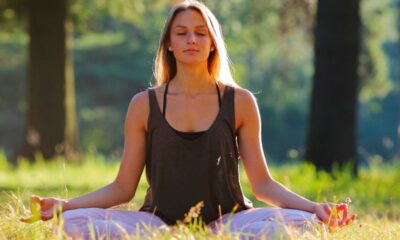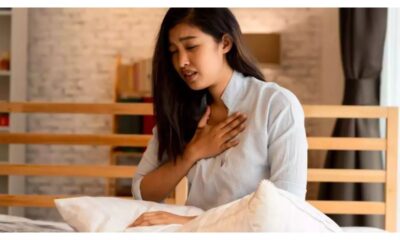The term “anxiety” is frequently used to characterize broad emotions of trepidation, uneasiness, or concern. But experiencing anxiety is not the same as having an anxiety condition.
While having anxiety is common during stressful moments in life, if your anxiety is ongoing and interfering with your day-to-day activities, you may be suffering from an anxiety disorder.
National Institute for Mental Health, NIH. disorders related to anxiety.
Anxiety is usually treated or controllable with a range of short- and long-term interventions, however it can be crippling for others. This post will offer various strategies for treating and overcoming anxiety.
How to Instantly Reduce Anxiety: 5 Techniques to Use
The symptoms of anxiety can be upsetting and have a negative effect on your life. There are numerous self-help methods for managing anxiety, even though each person’s needs will vary in terms of therapy.
Analyze Your Thought Process
Anxiety frequently results in uncontrollably obtrusive, upsetting images and troubling thoughts. Identifying negative thought patterns and substituting them with constructive ideas or thoughts is one strategy to break the cycle of negative thinking. Any positive vision has the power to lessen tension; it is not necessary for these images to be connected to the troubling circumstance.
Another thing you could attempt is doubting the accuracy of your ideas. Avoid concentrating on things that are unhelpful or untrue. As soon as you catch yourself thinking something cruel or false, stop and shift your focus to something more constructive.
If you think, “I’m so bad at public speaking,” for instance, a more constructive and constructive idea would be, “I’m not as skilled at public speaking as I am at other things, but I will set a goal for myself to practice and learn new techniques to improve.”
Inhaling deeply
One useful strategy for reducing anxiety symptoms in the moment is intentional breathing. Deep breathing techniques can be twice as beneficial because they both promote relaxation, which reduces stress in the body, and work as a diversion when employed as a focus point to break the cycle of bothersome thoughts.
Deep breathing exercises come in a variety of forms. Try this one, which is known as 4-7-8 breathing:
- Choose a comfortable position and consciously let your muscles relax.
- Shut your eyes or avert your focus.
- Count to four while you inhale deeply and let your tummy expand.
- Breathe out slowly and count to seven.
- Breathe out, tense your abdomen, and count to eight.
- Go on for however long you’d like.
Grounding Methods
Exercises that ground or “earth” the body help it become more connected to the outside world. Stabilizing factors like grounding can help with heart rate slowing, stress and anxiety reduction, and better sleep. Spending time in the grass, dirt, and other natural settings outside is the most straightforward method to learn grounding.
Try going barefoot or taking off your shoes to experience grounding, which works best when your skin makes direct contact with the Earth’s surface.
When it’s unsafe or impractical to spend time outside, special equipment can also be utilized for grounding.
Work out
Movement and physical activity are associated with improved mental health and a decrease in symptoms of anxiety. All movements that are structured, regular, and meant to promote health are considered forms of exercise. While the effects of exercise on different types of anxiety may vary, most exercises are beneficial in reducing symptoms, particularly when combined with other treatments such as counseling and medication.
Here are a few workout examples you can try:
- Exercises involving the heart, like riding, walking, hiking, or swimming
- Weight-bearing workouts include push-ups, squats, and weightlifting
- stretching techniques including tai chi, yoga, and Pilates
Before beginning a new fitness regimen, make sure to consult a healthcare professional.
Using aromatherapy
Using essential oils to enhance health and relaxation is known as aromatherapy. Different oils can be ingested, applied topically, added to compresses, inhaled, and used in baths. Certain essential oils have been demonstrated to lessen anxiety. Essential oils have long been utilized as an alternative form of medication.
Among them are: 5
- Rose oil
- Lavender
- Bergamot
- Orange
- Lemon
You may buy aromatherapy oils for usage at home over the counter. Make sure you understand the proper application of aromatherapy before using it, and never ingest an oil without first making sure it’s safe to do so. Speak with an aromatherapist for professional assistance on utilizing aromatherapy. They can help you choose which oils are best for your symptoms and provide tips on how to use them.
Long-Term Methods of Anxiety Management
Apart from instantaneous coping mechanisms, there exist ways for the long-term management of anxiety symptoms.
Determine Your Triggers and Learn to Control Them
You can identify when and what causes anxiety symptoms by keeping track of the items that either trigger or exacerbate them. Attempt to monitor your symptoms with a journal. Tell us about your pre-symptom activities and the duration of your symptoms.
Additionally, you can maintain a record of the alleviation techniques you’ve tried thus far, including the most and least successful ones. After you’ve recorded a few instances, go over them to look for any trends.
Take Therapy
Developing a long-term treatment plan and understanding your anxiety symptoms might be facilitated by working with a mental health professional. Cognitive behavioral therapy is the method of treating anxiety that is most frequently employed (CBT).
Coping strategies include relaxation techniques, problem-solving approaches, techniques to challenge or interrupt negative thoughts, and psychoeducation, all of which are taught in CBT.
Constant or Daily Meditation
Being mindful is focusing on the here and now rather than becoming mired in worry about the past or the future. By practicing mindfulness, you can lessen worry, rumination, and other anxiety-related symptoms.Six
Consider setting up time for meditation each day. There are numerous strategies to attempt. Here’s an easy way to get going:
- Close your eyes while you sit comfortably.
- Pay attention to your breathing now.
- Say “in breath” to yourself in a hushed manner while you take a breath.
- Call the breath you’re releasing “out breath.”
- You’ll begin to notice thoughts as you work on this. Observe them, call them “thoughts,” without passing judgment, and then return your focus to your breathing.
As you get more experience, increase the amount of time you spend doing this. Recall that the goal of meditation is not to clear your mind, but to become aware of and purposefully slow down your body and mind.
See a medical professional to find out more about anxiety medication options.
Modify Your Diet
Anxiety can be significantly impacted by diet. Generally speaking, anxiety symptoms can be brought on by or made worse by poor diets high in processed foods. The following nutritious diets are linked to decreased anxiety levels:
- The Mediterranean diet
- Anti-inflammatory diets
- Diets that feature large varieties of foods
The main components of these healthful diets are that they are low in sugar and refined grains and high in fruits, vegetables, whole grains, and minimally processed foods.
Adding supplements to diets can be a healthy approach to make up for missing nutrients. If you don’t get enough omega-3 fatty acids in your diet, for instance, taking a supplement can help with anxiety. Before taking any supplements, see your doctor, especially if you take any drugs.
Continue to Move
Over time, developing a regular exercise regimen can help prevent symptoms of anxiety. Make a plan that you can actually follow by identifying fun things to do that are both affordable and readily available. Putting a plan into action will make it simpler to stick to it if anxiety attacks get worse.
Journal
Writing in a journal is an excellent method to release nervous thoughts and monitor them over time. There is no right or incorrect method to journal; there are various approaches. Here are some suggestions to get you going:
- Maintain a journal.
- Every day, write down your feelings, behaviors, and thoughts.
- Write a report about your adventures.
- Make a mental dump.
- Observe a prompt.
Socialize
Isolation can be alluring in times of anxiety, particularly during the worst of the symptoms. Maintaining relationships with friends and family acts as a buffer against anxiety. Attempt scheduling and attending a minimum of one social gathering every week, despite any heightened anxiety. Try one of the aforementioned approaches, such breathing or grounding exercises, to deal with worry on the spur of the moment.
Participating in a live or virtual anxiety support group can also be beneficial. You can look up support groups online or get recommendations from a mental health professional.
Recognizing the Symptoms of Anxiety
Both panic and anxiety disorders are prevalent, disruptive, and difficult to manage. An anxiety attack is not the same as a panic attack, despite their similarities.
Symptoms of Anxiety
Anxiety disorders come in several forms, and each has a unique set of symptoms. Phobias, social anxiety disorder, and generalized anxiety disorder (GAD) are the most prevalent types of anxiety disorders. Another kind of anxiety condition is panic disorder, which is typified by panic attacks. The symptoms of anxiety might vary from person to person and based on the particular disease.
The following are a few typical signs of anxiety:
- Anxiety
- elevated heart rate
- Unease or trembling
- inability to concentrate
- Tiredness Having trouble falling asleep
- Uncontrollably anxious
Comparing Anxiety vs. Panic Attack
Panic attacks, as opposed to the frequently persistent emotions of anxiety, typically occur suddenly and without warning. Fast and shallow breathing, dizziness, chest pain, racing heart, and feelings of impending doom are all signs of a panic attack. When experiencing a panic attack, a person may feel as though they are going to die or detached from their body.
Even while anxiety episodes are not recognized as mental illnesses, some people may experience a rise in anxiety symptoms in response to a stressful or upsetting situation. Anxiety attacks are commonly defined as the sudden onset of anxiety symptoms.
In short
You can experiment with a variety of methods to control and alleviate anxiety. Try deep breathing exercises, grounding techniques, taking exercise, using aromatherapy, or replacing negative thought patterns with positive ones as coping mechanisms for anxiety in the moment. It may be beneficial to keep track of your triggers, seek therapy, or discuss medication with a healthcare professional in order to alleviate anxiety and manage chronic symptoms. It’s also been demonstrated that maintaining an active social life, writing, eating a balanced diet, and exercising all help reduce anxiety.

 Diabetology2 weeks ago
Diabetology2 weeks ago
 Diabetology2 weeks ago
Diabetology2 weeks ago
 Diabetology1 week ago
Diabetology1 week ago
 Diabetology2 weeks ago
Diabetology2 weeks ago
 Diabetology2 weeks ago
Diabetology2 weeks ago
 Diabetology2 weeks ago
Diabetology2 weeks ago
 Diabetology2 weeks ago
Diabetology2 weeks ago
 Diabetology1 week ago
Diabetology1 week ago

















